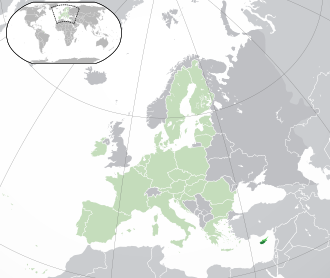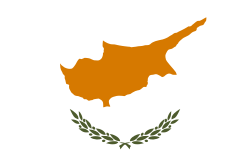
Back Кипр Abkhazian Siprus ACE Siprus Afrikaans Republik Zypern ALS ቆጵሮስ Amharic Cyprus AMI Chipre AN Cipros ANG Saipọrọs ANN सायप्रस ANP
Republic of Cyprus | |
|---|---|
| Anthem: Ὕμνος εἰς τὴν Ἐλευθερίαν[a] (English: "Hymn to Liberty") | |
 Location of Cyprus
| |
| Capital and largest city | Nicosia 35°10′N 33°22′E / 35.167°N 33.367°E |
| Official languages | |
| Minority languages | |
| Vernaculars | |
| Ethnic groups | |
| Religion (2020; including Northern Cyprus) |
|
| Demonym(s) | Cypriot |
| Government | Unitary presidential republic |
| Nikos Christodoulides | |
| Vacant[b] | |
| Annita Demetriou | |
| Legislature | House of Representatives |
| Independence from the United Kingdom | |
| 19 February 1959 | |
• Independence proclaimed | 16 August 1960 |
| 1 October 1960 | |
| Area | |
• Total[c] | 9,251 km2 (3,572 sq mi) (162nd) |
• Water (%) | 0.11[3] |
| Population | |
• 2021 census | |
• Density | 123.4[c][5]/km2 (319.6/sq mi) (82nd) |
| GDP (PPP) | 2025 estimate |
• Total | |
• Per capita | |
| GDP (nominal) | 2025 estimate |
• Total | |
• Per capita | |
| Gini (2022) | low inequality |
| HDI (2023) | very high (32nd) |
| Currency | Euro (€) (EUR) |
| Time zone | UTC+02:00 (EET) |
• Summer (DST) | UTC+03:00 (EEST) |
| Calling code | +357 |
| ISO 3166 code | CY |
| Internet TLD | .cy[e] |
Cyprus[f] (/ˈsaɪprəs/ ⓘ), officially the Republic of Cyprus,[g] is an island country in the eastern Mediterranean Sea. Situated in West Asia, its cultural identity and geopolitical orientation are overwhelmingly Southeast European. Cyprus is the third largest and third most populous island in the Mediterranean, after Sicily and Sardinia.[9][10] It is located southeast of Greece, south of Turkey, west of Syria and Lebanon, northwest of Israel and Palestine, and north of Egypt. Its capital and largest city is Nicosia. Cyprus hosts the British military bases Akrotiri and Dhekelia, whilst the northeast portion of the island is de facto governed by the self-declared Turkish Republic of Northern Cyprus, which is separated from the Republic of Cyprus by the United Nations Buffer Zone.
Cyprus was first settled by hunter-gatherers around 13,000 years ago, with farming communities emerging by 8500 BC. The late Bronze Age saw the emergence of Alashiya, an urbanised society closely connected to the wider Mediterranean world. Cyprus experienced waves of settlement by Mycenaean Greeks at the end of the 2nd millennium BC. Owing to its rich natural resources (particularly copper) and strategic position at the crossroads of Europe, Africa, and Asia, the island was subsequently contested and occupied by several empires, including the Assyrians, Egyptians, and Persians, from whom it was seized in 333 BC by Alexander the Great. Successive rule by Ptolemaic Egypt, the Classical and Eastern Roman Empire, Arab caliphates, the French Lusignans, and the Venetians was followed by over three centuries of Ottoman dominion (1571–1878).[11][h] Cyprus was placed under British administration in 1878 pursuant to the Cyprus Convention and formally annexed by the United Kingdom in 1914.
The island's future became a matter of disagreement between its Greek and Turkish communities. Greek Cypriots sought enosis, or union with Greece, which became a Greek national policy in the 1950s.[12][13] Turkish Cypriots initially advocated for continued British rule, then demanded the annexation of the island to Turkey, with which they established the policy of taksim: portioning Cyprus and creating a Turkish polity in the north of the island.[14] Following nationalist violence in the 1950s, Cyprus was granted independence in 1960.[15] The crisis of 1963–64 brought further intercommunal violence between the two communities, displaced more than 25,000 Turkish Cypriots into enclaves,[16]: 56–59 [17] and ended Turkish Cypriot political representation. On 15 July 1974, a coup d'état was staged by Greek Cypriot nationalists[18][19] and elements of the Greek military junta.[20] This action precipitated the Turkish invasion of Cyprus on 20 July,[21] which captured the present-day territory of Northern Cyprus and displaced over 150,000 Greek Cypriots[22][23] and 50,000 Turkish Cypriots.[24] A separate Turkish Cypriot state in the north was established by unilateral declaration in 1983, which was widely condemned by the international community and remains recognised only by Turkey. These events and the resulting political situation remain subject to an ongoing dispute.
Cyprus is a developed representative democracy with an advanced high-income economy and very high human development.[25][26][27] The island's intense Mediterranean climate and rich cultural heritage make it a major tourist destination.[28] Cyprus is a member of the Commonwealth of Nations and a founding member of the Non-Aligned Movement until it joined the European Union in 2004;[29] it joined the eurozone in 2008.[30] Cyprus has long maintained good relations with NATO and announced in 2024 its intention to officially join.[31]
- ^ "National Anthem". presidency.gov.cy. Archived from the original on 13 August 2011. Retrieved 3 June 2015.
- ^ "Cyprus". Global Religious Future. Pew Research Center. Archived from the original on 17 July 2014. Retrieved 13 July 2021.
- ^ a b Cite error: The named reference
CIAwas invoked but never defined (see the help page). - ^ "Census of Population and Housing 2021, Preliminary Results by District, Municipality/Community". Nicosia: Statistical Service of Cyprus. 4 August 2023. Archived from the original on 24 May 2022. Retrieved 4 August 2023.
- ^ "World Population Prospects: The 2012 Revision, DB02: Stock Indicators". United Nations, Department of Economic and Social Affairs, Population Division. New York. 2013. Archived from the original on 7 May 2015. Retrieved 18 June 2015.
- ^ a b c d "World Economic Outlook Database, April 2025". Washington, D.C.: International Monetary Fund. 22 April 2025. Retrieved 22 April 2025.
- ^ "Gini coefficient of equivalised disposable income – EU-SILC survey". Luxembourg: Eurostat. 28 June 2023. Archived from the original on 9 October 2020. Retrieved 10 August 2023.
- ^ "Human Development Report 2025" (PDF). United Nations Development Programme. 6 May 2025. Archived (PDF) from the original on 6 May 2025. Retrieved 6 May 2025.
- ^ Pariona, Amber (4 August 2017). "Biggest Islands In The Mediterranean Sea By Area". WorldAtlas. Archived from the original on 12 May 2018. Retrieved 11 May 2018.
- ^ Nag, Oishimaya Sen (15 August 2017). "The Most Populated Islands In The Mediterranean Sea". WorldAtlas. Archived from the original on 12 May 2018. Retrieved 11 May 2018.
- ^ "Treaty of Lausanne". Archived from the original on 12 January 2013. Retrieved 7 October 2014.
- ^ Faustmann, Hubert; Ker-Lindsay, James (2008). The Government and Politics of Cyprus. Peter Lang. p. 48. ISBN 978-3-03911-096-4. Archived from the original on 17 May 2024. Retrieved 23 September 2020.
- ^ Mirbagheri, Farid (2009). Historical Dictionary of Cyprus. Scarecrow Press. p. 25. ISBN 9780810862982. Archived from the original on 17 May 2024. Retrieved 23 September 2020.
- ^ Trimikliniotis, Nicos (2012). Beyond a Divided Cyprus: A State and Society in Transformation. Palgrave Macmillan. p. 104. ISBN 978-1-137-10080-1. Archived from the original on 17 May 2024. Retrieved 23 September 2020.
- ^ Cite error: The named reference
independencewas invoked but never defined (see the help page). - ^ Cite error: The named reference
Hoffmeister 2006was invoked but never defined (see the help page). - ^ Cite error: The named reference
Intercommunal Violencewas invoked but never defined (see the help page). - ^ Mallinson, William (2005). Cyprus: A Modern History. I. B. Tauris. p. 81. ISBN 978-1-85043-580-8. Archived from the original on 17 May 2024. Retrieved 23 September 2020.
- ^ "website". BBC News. 4 October 2002. Archived from the original on 26 July 2004. Retrieved 25 October 2009.
- ^ Hoffmeister, Frank (2006). Legal aspects of the Cyprus problem: Annan Plan and EU accession. EMartinus Nijhoff Publishers. pp. 34–5. ISBN 978-90-04-15223-6.
- ^ Eyal Benvenisti (23 February 2012). The International Law of Occupation. Oxford University Press. p. 191. ISBN 978-0-19-958889-3. Archived from the original on 10 September 2015. Retrieved 20 June 2015.
- ^ Barbara Rose Johnston, Susan Slyomovics. Waging War, Making Peace: Reparations and Human Rights (2009), American Anthropological Association Reparations Task Force, p. 211 Archived 12 April 2016 at the Wayback Machine
- ^ Morelli, Vincent. Cyprus: Reunification Proving Elusive (2011), DIANE Publishing, p. 10 Archived 13 April 2016 at the Wayback Machine
- ^ Borowiec, Andrew. Cyprus: A Troubled Island (2000), Greenwood Publishing Group, p. 125 Archived 12 April 2016 at the Wayback Machine
- ^ Lesley Pender; Richard Sharpley (2005). The Management of Tourism. SAGE. p. 273. ISBN 978-0-7619-4022-7. Archived from the original on 10 September 2015. Retrieved 20 June 2015.
- ^ Richard Sharpley (16 May 2012). Tourism Development and the Environment: Beyond Sustainability?. Routledge. p. 296. ISBN 978-1-136-57330-9. Archived from the original on 18 September 2015. Retrieved 20 June 2015.
- ^ Sharpley, Richard; Telfer, David John (2002). Tourism and Development: Concepts and Issues. Channel View Publications. p. 334. ISBN 978-1-873150-34-4. Archived from the original on 18 September 2015. Retrieved 22 July 2015.
- ^ "Cyprus | History, Flag, Map, & Facts | Britannica". www.britannica.com. 3 June 2025. Retrieved 6 June 2025.
- ^ "The Non-Aligned Movement: Background Information". Non-Aligned Movement. 21 September 2001. Archived from the original on 9 February 2016. Retrieved 19 January 2010.
- ^ "Human Development Index (HDI)–2011 Rankings". Stanford University. Archived from the original on 3 April 2015. Retrieved 17 November 2019.
- ^ "Cyprus Wants U.S. Help to Join NATO, But Turkey Stands in the Way". The National Herald. 7 December 2024. Retrieved 13 December 2024.
Cite error: There are <ref group=lower-alpha> tags or {{efn}} templates on this page, but the references will not show without a {{reflist|group=lower-alpha}} template or {{notelist}} template (see the help page).
© MMXXIII Rich X Search. We shall prevail. All rights reserved. Rich X Search

